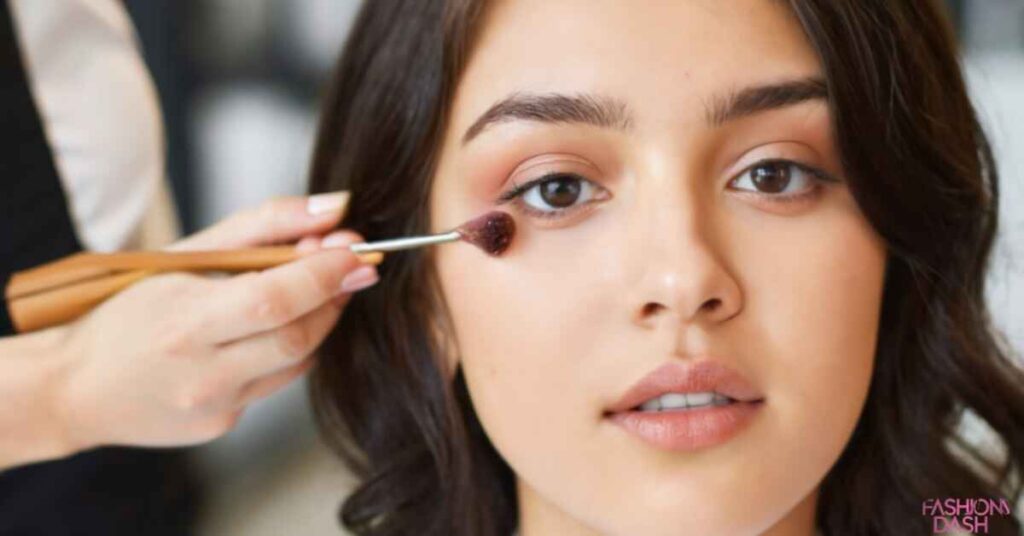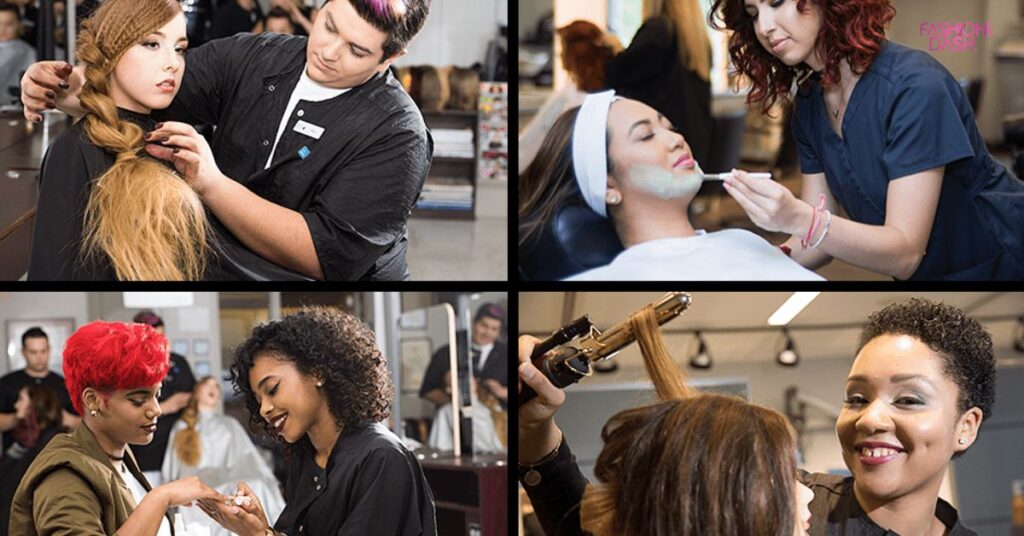A cosmetologist is a licensed professional who beautifies hair, skin, and nails through various cosmetic treatments.
Their diverse roles include hairstyling (cutting, coloring, texturizing), barbering for male clients, providing skin care services like facials and hair removal, applying makeup artistry, and performing nail care like manicures and pedicures.
With comprehensive training, cosmetologists master techniques across multiple beauty disciplines to enhance clients’ appearances. Career paths range from salon stylists to makeup artists, nail technicians, salon owners, and more in this creative, people-oriented field.
What is a Cosmetologist?

In the ever-evolving realm of beauty and aesthetics, cosmetologists are the masterminds behind transformations that enhance outer appearances and boost confidence. These skilled professionals are trained in the art and science of beautifying hair, skin, and nails through a diverse range of cosmetic treatments and services.
Cosmetologists by Definition
A cosmetologist is an expert in applying cosmetic procedures, therapies, and treatments to beautify one’s outer appearance. They are licensed professionals who specialize in implementing cosmetic treatments to people’s hair, skin, and nails. Specific disciplines in cosmetology include hairstyling (hair cutting and coloring), esthetics (skincare), makeup application, nail care (manicures and pedicures), and other beauty treatments.
Read This Blog: CAN BED BUGS GET IN YOUR HAIR
What Does a Cosmetologist Do?
Cosmetologists are multi-talented individuals whose responsibilities span various beauty-related disciplines. They are the masterminds behind stunning hairstyles, radiant complexions, and impeccable nail designs. Let’s delve into the diverse tasks that a cosmetologist undertakes:
Hair Styling
- Washing, shampooing, drying, and cutting hair
- Shaping, cutting, texturizing, styling, straightening, or curling hair
- Coloring, tinting, lightening hair
- Chemically changing hair texture through perms or relaxers
- Braiding hair and installing hair extensions or weaves
Barbering
While hair styling typically caters to women, men, and children, barbering has traditionally focused on male clients. A barber’s responsibilities include:
- Cutting, trimming, shampooing, and styling hair
- Shaving facial hair
- Fitting hairpieces
- Coloring or perming hair
- Performing facial treatments
Esthetics
Estheticians, or skincare specialists, focus on enhancing and maintaining the health and appearance of the skin. Their services may include:
- Facials and exfoliation treatments
- Skin conditioning and wrinkle reduction therapies
- Waxing, tweezing, eyebrow threading, and hair removal techniques
- Anti-aging treatments and product recommendations
Nail Technician

Nail technicians are true artists when it comes to beautifying and adorning fingernails and toenails. Their expertise lies in:
- Manicures and pedicures
- Nail artistry and nail jewelry application
- Applying and maintaining gel nails, silk nails, and acrylic nails
Makeup Artist
Makeup artists are skilled in transforming faces and creating stunning looks for various occasions. Their talents are sought after in industries such as:
- Professional photography studios
- Cinema and special effects
- Fashion shows and editorial shoots
- Weddings and special events
Electrology
Electrologists use specialized equipment to facilitate permanent hair removal. Electricity is applied to damaged hair follicles, preventing future hair growth. This field often requires additional certification due to the nature of the procedure.
Also Read This Blog: IS SUAVE GOOD FOR YOUR HAIR
Cosmetologist Requirements
Cosmetology is a regulated, state-licensed industry, and each state in the United States and countries like the United Kingdom have slightly different licensing requirements. In general, to become a cosmetologist, you must:
- Be over the age of 16 (or 18 in some states/countries)
- Possess a high school diploma or GED
- Successfully complete a state-approved cosmetology program
- Pass the state board of cosmetology licensing exam
After graduation, each state or country typically has requirements for maintaining your cosmetology license, such as continuing education credits.
What are the Career Path Opportunities for a Cosmetologist?

The beauty industry offers a wide array of career opportunities for licensed cosmetologists. After graduating from cosmetology school and obtaining their license, cosmetologists can pursue various paths, including:
- Hair Stylist
- Hair Colorist
- Salon Owner or Manager
- Platform Artist (demonstrating techniques at events/shows)
- Celebrity or Personal Stylist
- Cosmetology Editor (writing for industry publications)
- Salon Trainer (educating and mentoring staff)
- Educator (after completing the Educator course)
- Manicurist & Pedicurist
- Cosmetic Buyer or Sales Consultant
- Cosmetology Instructor
- State Board Member
- State Licensing Inspector or Examiner
- “Outside the Box” Cosmetology Careers (product development, marketing, etc.)
The possibilities are endless, and cosmetologists can tailor their careers to align with their passions and strengths.
Request More Information
Interested in learning more about the exciting world of cosmetology and the various career paths available? Request more information today to take the first step towards a fulfilling career in the beauty industry.
What Does a Cosmetologist Do?
As a cosmetologist, your days will be filled with diverse tasks and responsibilities that cater to the ever-evolving needs of your clients. From transforming hair into stunning masterpieces to pampering skin with rejuvenating treatments, and adorning nails with intricate designs, you’ll be a true artist in the world of beauty.
Product + Service Packages
Cosmetology schools often offer comprehensive programs that cover a wide range of services and techniques. These programs typically include:
- Haircutting and styling
- Hair coloring and highlighting
- Chemical treatments (perms, relaxers, straightening)
- Skincare and facials
- Makeup application
- Nail care (manicures, pedicures, artificial nails)
- Waxing and hair removal
- Salon operations and management
By completing a cosmetology program, you’ll gain the knowledge and hands-on experience necessary to excel in various aspects of the beauty industry.
Find a Cosmetology Program Near You

Ready to embark on an exciting journey in the world of cosmetology? Search for accredited cosmetology programs in your area and take the first step towards a rewarding career as a licensed cosmetologist.
Become a Cosmetologist in 13 Months!
Many cosmetology programs can be completed in as little as 13 months, allowing you to enter the workforce as a licensed professional in a relatively short period of time. Don’t wait – start exploring your options today!
What is Cosmetology? What Does It Include?
Cosmetology is the art and science of beautifying the hair, nails, and skin. It encompasses a broad range of disciplines, including:
- Hairstyling: Cutting, coloring, styling, and chemically treating hair.
- Esthetics: Skincare treatments such as facials, hair removal, and makeup application.
- Nail Care: Manicures, pedicures, nail art, and artificial nail enhancements.
- Barbering: Traditionally focused on male grooming, including haircuts, shaves, and facial treatments.
Cosmetologists are trained in various techniques and products to enhance their clients’ overall appearance and well-being.
Job Outlook for Cosmetologists
According to the Bureau of Labor Statistics, the job outlook for cosmetologists, barbers, and hairstylists is very promising. The industry is projected to grow by approximately 19% from 2020 to 2030, which is much faster than the average for all occupations.
This positive trend is driven by factors such as:
- Increased demand for personal appearance services
- Growth in the number of nail salons and skincare establishments
- Rising popularity of cosmetic treatments and procedures
As the beauty industry continues to thrive, cosmetologists with the right skills and qualifications will be well-positioned to find rewarding employment opportunities.
Career Paths for Cosmetologists
The beauty industry offers a wide range of career paths for licensed cosmetologists, allowing them to explore various specializations and work environments. Some popular options include:
- Salon Stylist or Colorist
- Makeup Artist (bridal, fashion, entertainment)
- Nail Technician
- Hairdressing Instructor
- Salon or Spa Manager
- Salon Owner (entrepreneurship)
- Platform Artist or Industry Educator
- Product Development or Marketing
- Editorial or TV/Film Stylist
Additionally, cosmetologists can pursue “outside the box” careers, such as working in product development, marketing, or editorial roles within the beauty industry.
Interested in Becoming a Cosmetologist?
If the diverse and creative world of cosmetology has piqued your interest, consider exploring accredited cosmetology programs in your area. These programs will provide you with the necessary education, training, and hands-on experience to prepare you for a successful career in the beauty industry.
Succeeding as a Cosmetologist

While technical skills are crucial, succeeding as a cosmetologist requires more than just mastering techniques. Building a successful career in this field also involves:
- Cultivating strong interpersonal and customer service skills
- Developing a keen eye for detail and a passion for creativity
- Staying up-to-date with the latest trends, techniques, and products
- Networking and building a loyal client base
- Considering specializations or niche markets (e.g., bridal, editorial, etc.)
Additionally, cosmetologists must possess physical stamina, as the job often requires standing for extended periods and performing repetitive motions.
Cosmetology Programs
To become a licensed cosmetologist, individuals must complete an accredited cosmetology program. These programs typically include both theoretical and practical components, covering a wide range of topics and techniques.
At the Paul Mitchell The School at Campus (formerly known as MTI College) in Sacramento, for example, the cosmetology program covers:
- An overview of the cosmetology industry
- State regulations, sanitation, and chemistry
- Basic techniques in cutting, coloring, and styling hair
- Skincare and nail care
- Advanced makeup techniques
Students first learn the theoretical foundations and then gain hands-on experience through supervised practice on the clinic floor and in the school’s salon.
Upon completing the program, students are prepared to take the written and practical examinations required for licensure by the California State Board of Barbering and Cosmetology.
Licensing and Certifications Required to be a Cosmetologist

To legally practice as a cosmetologist, individuals must obtain a license from the state or country in which they plan to work. In the United States, licensing requirements vary slightly from state to state, but generally include:
- Completing a state-approved cosmetology program
- Passing a written examination
- Passing a practical (hands-on) examination
Once licensed, cosmetologists may need to complete continuing education courses or renew their licenses periodically to maintain their credentials.
It’s important to note that some specialized areas within cosmetology, such as electrology (permanent hair removal), may require additional certifications or licenses beyond a basic cosmetology license.
What is the Paul Mitchell School at Campus like?
The Paul Mitchell School at Campus (formerly MTI College) in Sacramento provides a comprehensive and immersive learning experience for aspiring cosmetologists. Here’s a glimpse into what students can expect:
- State-of-the-art facilities and equipment
- Experienced instructors with industry expertise
- Hands-on training in a real-world salon environment
- Exposure to the latest techniques and product lines
- Career development and business management courses
- Opportunities to participate in hair shows and competitions
- Support services such as job placement assistance
By attending the Paul Mitchell The School at Campus, students receive a well-rounded education that prepares them for success in the dynamic world of cosmetology.
Frequently Asked Question
What education is required to become a cosmetologist?
To become a licensed cosmetologist, you must complete an accredited cosmetology program and pass state licensing exams. These programs typically include both theoretical and hands-on training.
Can cosmetologists specialize in a particular area?
Yes, cosmetologists can pursue specializations such as hair styling, coloring, makeup artistry, nail technology, or esthetics (skincare) based on their interests and strengths.
What are the typical duties of a hair stylist?
Hair stylists are responsible for cutting, coloring, styling, and chemically treating hair. They also provide consultations and recommend appropriate haircare products and treatments.
What services do estheticians or skincare specialists offer?
Estheticians perform services like facials, hair removal (waxing, threading), makeup application, and advise clients on skincare regimens and products.
How do nail technicians enhance clients’ nails?
Nail technicians provide manicures, pedicures, apply artificial nail enhancements (acrylics, gels), and create intricate nail art designs.
Where do cosmetologists typically work?
Common workplaces for cosmetologists include salons, spas, resorts, hotels, barbershops, and some may even open their own businesses.
Is continuing education necessary for cosmetologists?
Yes, most states require cosmetologists to complete continuing education credits periodically to maintain their licenses and stay updated on industry trends and techniques.
What qualities are important for success as a cosmetologist?
Key qualities include creativity, attention to detail, strong customer service skills, physical stamina, business acumen, and the ability to build a loyal client base.
Conclusion
The world of cosmetology offers a diverse and rewarding career path for those with a passion for beauty and creativity. As licensed professionals, cosmetologists undergo extensive training to master a wide range of skills, from intricate hair styling and coloring techniques to rejuvenating skincare treatments and glamorous nail artistry. Their roles extend beyond technical expertise, as they must cultivate strong interpersonal skills, stay attuned to the latest trends, and develop a keen eye for detail.
With numerous career opportunities available, such as salon styling, makeup artistry, nail technology, and salon ownership, cosmetologists have the freedom to explore various specializations and work environments. Ultimately, this dynamic profession allows individuals to turn their artistic talents into a fulfilling career that enhances clients’ confidence and overall well-being.

Clara , a fashion blogger with four years of experience, specializes in creating captivating content on fashion trends, styling tips, and beauty hacks, establishing herself as a trusted resource for fashion enthusiasts.







